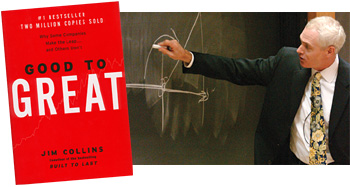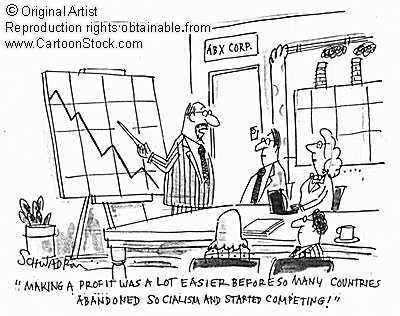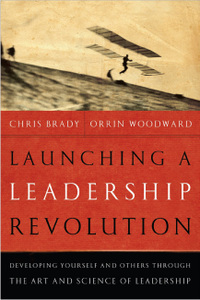I am researching the habits of leaders. Self-discipline is critical to
a successful life and it takes self-discipline to develop the right habits. Like they say, “You make your habits and your habits make you.” In the spirit of the Wikinomics book, I am going to open up the discussion on habits for all. Here is an article discussing some important leadership habits, but I think there are others. Please read this list of leadership habits and add a habit and your thoughts. All of us are on a leadership journey and I am curious on the habits we feel are essential to leadership. The readers of this blog are the best! God Bless, Orrin Woodward
Many people are born leaders, yet the ability to lead is actually an art and an amazing collection of skills which can be learned and sharpened. The following top ten daily habits will help you and/or your clients grow as a leader personally, professionally, and spiritually.
 1. Spend 30 minutes each morning looking for “cracks” in the major
1. Spend 30 minutes each morning looking for “cracks” in the major
areas of your life.
Your depth of character is key to
determining your success as a leader. It is easy for us to say that we are “in
integrity,” but your actions are the real indicators of strength of character.
Spend 30 minutes each morning looking at the major areas of your life: career, marriage, family, community, and spirituality. Write down any instances where you see “cracks” (you have cut corners, something is inconsistent, you have not kept your word, you have been dishonest, etc.) Do all in your power to repair those cracks by apologizing and dealing with the consequences of your actions. After facing up to past actions, begin a plan that will rebuild you and prevent you from making further mistakes.
2. Show up and be ten minutes early for every appointment.
Great leaders show up for every appointment, and they are always on time. Each day, practice not only showing up but being ten minutes early for each and every appointment. “The early bird gets the worm” has never been so true than when it applies to becoming a great leader that others want to follow.
3. Be dedicated to a high level of learning.
Great leaders are highly competent, because they are dedicated to a high level of learning, growth, and improvement. Spend 15-30 minutes each day devoted to learning something new. Do not settle for knowing “how” to do something. Dig deeper by asking the question “why” and then, go find the answer. Search the internet, interview an expert, or take a day trip to find the answer to a question that is on your mind or the minds of those who follow you.
4. Be simple and crystal clear in all communication.
As a leader, your communication should be simple, clean, and clear as a bell. Examine both written and verbal communication for simplicity and clarity. Use as few words as possible, and eliminate jargon and “big words” from your vocabulary. Express yourself in a way that your listeners can understand.
5. Surround yourself with great people.
One of the secrets of a great leader is great people. Hire the right staff, surround yourself with a strong inner circle, and spend time daily with people who have a variety of gifts. With the support of a strong circle of men, women and children, you will be ready for anything that comes your way.
6. Develop a sense of commitment and responsibility.
People do not follow leaders who are not committed and responsible. Commitment and responsibility can be measured by the hours you spend and how you spend them, the money you spend and how you spend it, and by what you do for others. Spend 15 minutes each day analyzing your time, your checkbook, and your volunteer work. Look closely at how much time you spend with family and friends as compared to work, how you spend your money, and how you give back to the community. You may be very surprised at what you find.
7. Develop a positive attitude by altering your mind.
It is very possible to alter your attitude by altering your mind. Saturate yourself daily with motivational literature, positive people, and inspiring music/art. By conditioning your mind to be more positive on a daily basis, you will find that winning will be a daily reward of your life.
8. Accept responsibility.
Great leaders never play the role of a victim. They recognize that part of being a great leader is being ultimately responsible for all successes and failures. On a daily basis, analyze your current projects, and ask yourself “Have I done all that needs to be done? What have I not done that I should?” Once you have analyzed each project, if you find a weakness, go the extra mile by working extra hours, hiring an outside expert, or getting really creative to repair the weakness or to turn it into a success!
9. Make self-discipline a part of your lifestyle.
What do you need to develop self-discipline? Following a better diet or exercise routine? Getting up one hour earlier? Being rigorous with your spending? Learning something new every day? Eliminate excuse-making from your life, and begin to develop habits that will invite self-discipline to become the foundation of your life. Hire a coach to support you during the development of a routine of self-discipline, and remove rewards until the job is done!
10. Develop courage by facing fear.
By a show of courage, you will inspire others to follow and to walk in your footsteps. Spend 15-30 minutes each day doing something simply for the sake of developing courage: speak to an audience, make a difficult phone call, learn a new skill, write an article or a top ten, or visit someone you have always wanted to meet. As Eleanor Roosevelt acknowledged: “You gain strength, courage, and confidence by every experience in which you really stop to look fear in the face. You are able to say to yourself, ‘I lived through this horror. I can take the next thing that comes along.’ You must do the thing you think you cannot do.”














